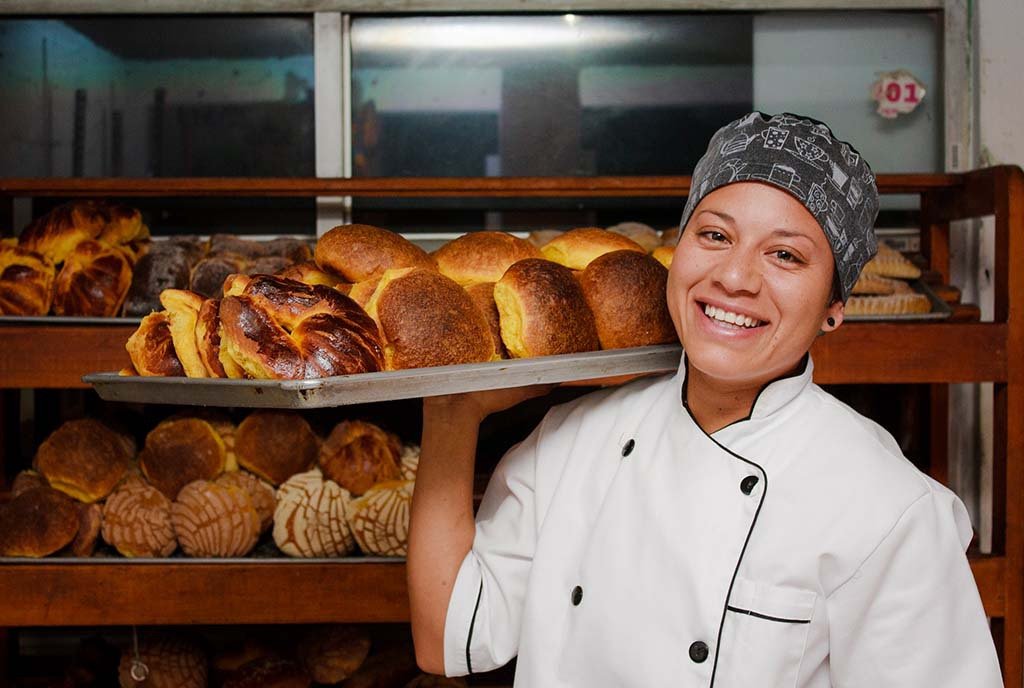
Caroline Johnston, founder of GreenIsland Bakery in Washington, DC, says that she “always wanted to create a social enterprise” to help women recover from trauma. To carry out her vision, she launched the for-profit bakery in 2020 that, by design, is leveraging its business operations to create sustainable partnerships with local workforce development organizations that can help support the people she works with.
GreenIsland’s is not a unique business model but is emblematic of what are sometimes called employment social enterprises (ESEs). By linking a social mission to the business, ESEs recruit workers other businesses often ignore, provide workforce training, and design interventions to support participants.
These businesses are bringing racial and economic equity into the field of workforce development, especially for victims of trauma. At GreenIsland, for instance, the mission statement includes a goal of offering training and recovery coaching for women recovering from trauma, such as domestic abuse and mental health issues.
GreenIsland may be a relatively new business in Washington, DC, but it is successful. Today, it supplies over 50 stores in the region with its products. The staff includes five women and one man, all people of color, who work as a pastry chef, a baker, two packaging specialists, an events manager, and an intern.
A Business Idea Is Born
The idea of GreenIsland Bakery, Johnston said, is to offer traditional Irish and British baked goods. Two factors, both of which drew on her past, led her to launch the bakery. One involved Johnston’s memories of learning to bake from her mother at a young age. The other was growing up just outside of Belfast during the decades of the Northern Ireland violent conflict known as the Troubles. From the 1960s through 1998, Northern Ireland suffered over 10,000 bombings and shootings in the conflict; the overall death toll topped 3,500 people.
Baking is a therapeutic, multisensory activity that mitigates anxiety and post-traumatic stress disorder.
Johnston notes: “I grew up in the area called Greenisland, outside of the city but with little pockets of paramilitary activity. And my school, which was ‘integrated’—it had both Catholic and Protestant students—was in the center of Belfast.”
Her memories as a schoolgirl include being suddenly awakened by car bomb explosions, as well as living with shootings and killings in the neighborhood. “Many people in the region developed PTSD from the years of anxiety during this time,” she observes. This history led her to want to support others who had experienced trauma.
Mindful Baking
The baking workshop idea came to life during the pandemic. Johnston found herself wondering why everyone was baking during the COVID-19 shutdown. Her curiosity led to research, and she found that baking is a therapeutic, multisensory activity that mitigates anxiety and post-traumatic stress disorder.
The twin goals of developing a thriving bakery business and promoting recovery within it began to come together when Johnston decided to create a “mindful baking” workshop, grounded in the realization that a kitchen can be a place to experience healing, learn mindfulness, and build teams. “The goal is to take you back to feeling at home, cozy, protected,” as she puts it.
Sign up for our free newsletters
Subscribe to NPQ's newsletters to have our top stories delivered directly to your inbox.
By signing up, you agree to our privacy policy and terms of use, and to receive messages from NPQ and our partners.
This resulted in offerings of both standalone tailored workshops and a more extended personal and professional development program.
The personal and professional development program meets weekly for 90-minute sessions over three months. Participants spend the first month building self-awareness through coaching, and creating a personal and professional development plan. The second month explores integrating this plan in the workplace, along with developing business skills around sales, marketing, presenting, financial management, and operations. The final month includes instruction in baking, drawing on the skills of the GreenIsland team.
Graduates may become prospects for hiring at the bakery. If they are seeking jobs elsewhere, GreenIsland staff help with coaching. For these graduates, GreenIsland also offers a work placement program that meets twice a week and provides training and mentoring (using both coursework and one-on-one coaching) in business plan creation, communications, sales, personal finance, understanding legal documents, and leadership.
For now, the workshops are internally funded by bakery profits. Still, Johnston aims to identify outside funding sources, such as project partner sponsorships, to increase workshop capacity and offerings.
A Broader Mission
Social enterprises are…one powerful response that can help people recover from traumatic events and obtain gainful and meaningful employment.
Two key partners are Ayuda, a DC-based immigrant services organization that often refers participants to GreenIsland, and the nonprofit REDF, which runs a national ESE accelerator program. Johnston says she plans to formally enroll in REDF’s program in January 2024.
REDF, founded in 1997, estimates there are now 700 ESEs operating in the United States, employing tens of thousands of people. “Many of these enterprises would not be aware that they’re called ESEs,” points out REDF’s Jaclynn Coussa. What they have in common is their commitment to economic and racial equity on behalf of individuals who have experienced difficulties of various kinds—including incarceration, human trafficking, and mental illness. Beyond that, Coussa notes, is the growing number of REDF accelerator participants who now hope to launch ESEs themselves.
Social enterprises are hardly new, but a growing crisis of care is helping to encourage the proliferation of ESEs as one powerful response that can help people recover from traumatic events and obtain gainful and meaningful employment.










